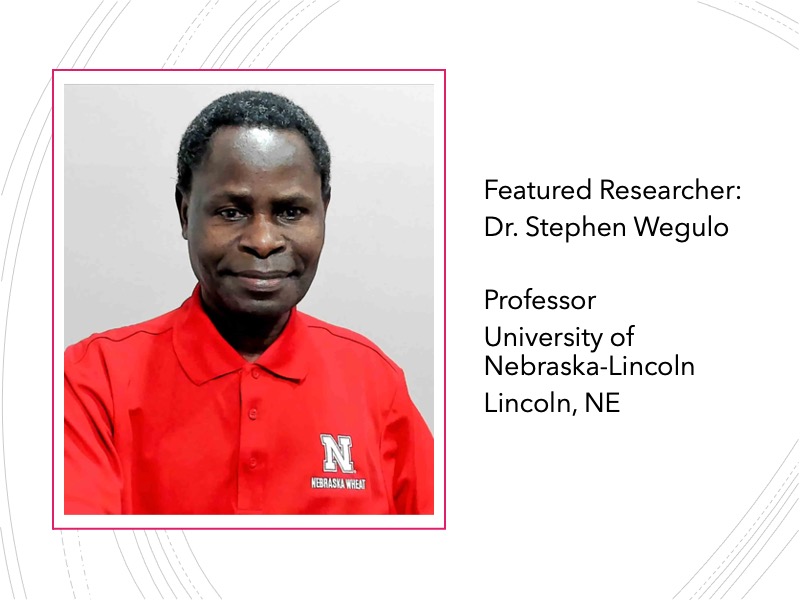Featured Researcher Bio - Stephen Wegulo December 2021

Meet Stephen Wegulo, Ph.D., a professor in the Department of Plant Pathology at the University of Nebraska-Lincoln. Dr. Wegulo started as a PI with the U.S. Wheat and Barley Scab Initiative (USWBSI) 15 years ago, in 2007. Leading a plant pathology based research program, his projects have focused on the epidemiology and integrated management of Fusarium Head Blight (FHB) in winter wheat.
On the Path to Epidemiology
Dr. Wegulo was born and raised in a rural village in Kenya. At the Kenya Science Teachers College, he studied biology and math for two years receiving a Diploma in Science Education in 1985. Prior to moving to North Carolina, he taught high school biology and mathematics for three years. In 1988, Dr. Wegulo started his B.S. in biology at Davidson College, located in Davidson, NC. During his undergraduate career, Dr. Wegulo would return to Kenya every summer. A fellow villager, Dr. Stanley Waudo, often gave Wegulo rides from the airport in Kenya. Having degrees in both plant pathology and nematology himself, Dr. Waudo influenced Wegulo’s decision to apply to several plant pathology programs in the U.S. for graduate school.
Following a brief teaching position in Kenya, Wegulo returned to the U.S. to study plant pathology at the University of Iowa under the supervision of Dr. Forrest Nutter and Dr. Charlie Martinson. Completing his M.S. in 1994 on the benefits of fungicide use to manage foliar disease of seed corn, Wegulo immediately began his Ph.D. program under the mentorship of Dr. Xiao-Bing Yang and Dr. Charlie Martinson. His research was focused on the epidemiology and management with cultivar resistance of soybean white mold.
Since completing his Ph.D., Dr. Wegulo has worked in the areas of fruits and vegetables, ornamental plants, and wheat pathology.
Concentrating on Cereals
Dr. Wegulo’s research interests include the areas of epidemiology and management of plant diseases with an emphasis on wheat. His current research program is focused on the epidemiology and integrated management of Fusarium head blight (scab) of wheat. According to Wegulo, his biggest scab accomplishment is that the “information generated from my research on the epidemiology and management of Fusarium head blight has enabled Nebraska wheat growers to more effectively manage the disease, saving tens of millions of dollars over the 15 years I have been working on scab.”
His next greatest accomplishment would be screening lines in collaboration with Dr. P. Stephen Baenziger (former UNL small grains breeder) which has contributed to the release of varieties with increased resistance to FHB that have a huge economic impact in Nebraska and the surrounding states.
In addition to scab research, recently Dr. Wegulo wrote the chapter “Advances in understanding the epidemiology of Fusarium in cereals” in Achieving Durable Disease Resistance in Cereals. This is one of three chapters in the book dedicated to FHB. The chapter uses FHB as a model to illustrate the epidemiology of Fusarium graminearum. Wegulo covers the topics of life cycle, mycotoxin production, environmental factors and the influence of management practices on disease development, predicting FHB epidemics and more.
Tips for Young Scientists
Dr. Wegulo’s advice to graduate students and early career professionals is to strive to succeed and have a passion for your work. He also encourages seeking out collaborations often as these relationships are key to success. But as a reminder, balance work life with personal and family life.
If you are interested in learning more about Dr. Stephen Wegulo you can view his research page and reach him via email.
You can also check out the series of previous USWBSI Featured Researchers.
